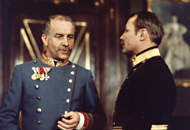Schnitzler/Freud
Fridolin's dream (?) is in a professional sense a lot like Freud's first analyzed dream in one part. When Fridolin goes to the home of the Court Counsellor (climbing to the second floor, the superego or conscience), he sees his corpse in green lamp-light (this makes me think of Schiele's creepier green-tinged portraits). This I see as a wish fulfilled; he is indicated to be a frequent patient that took a lot of time and travel, and Fridolin in real life wanted his suffering to end and for his daughter to be free to marry.
He seems to be concerned that Marianne's erotic power was being sapped by her role as nursemaid to her sick father. Fridolin thinks she loves him, and notes that her cheeks flush red when he enters the room (evoking an image of a post-coital flush), another probable wish. He cares more for her than the dream indicates (he is later indifferent to her when she is leaving), since he is concerned about the happiness of her forthcoming marriage and realizes he considers himself the lesser to her fiance (he wishes to have a professorship, and so he consoles himself in the dream with Marianne's love). He and her fiance seem twinned by Schnitzler, and their exchange of pleasantries conclude the story.
The corpse in the room serves as a backdrop for her confession of love; Fridolin thinks fondly of the forthcoming springtime when the window is opened (the circular nature of death and life, his wish to free Marianne from a house full of the stink of death) and he thinks that possibly she is hysterical and then that her father is not dead. This corpse foreshadows the morgue scene later in the story. Fridolin remembers a story about a boy raped by his dead mother's best friend at his mother's death-bed, mixing eroticism and death again. He thinks of his wife and her confession when he and Marianne embrace lovelessly, and is disgusted by the death smell in her clothes. What do you make of the absent brother and his painting?



No comments:
Post a Comment